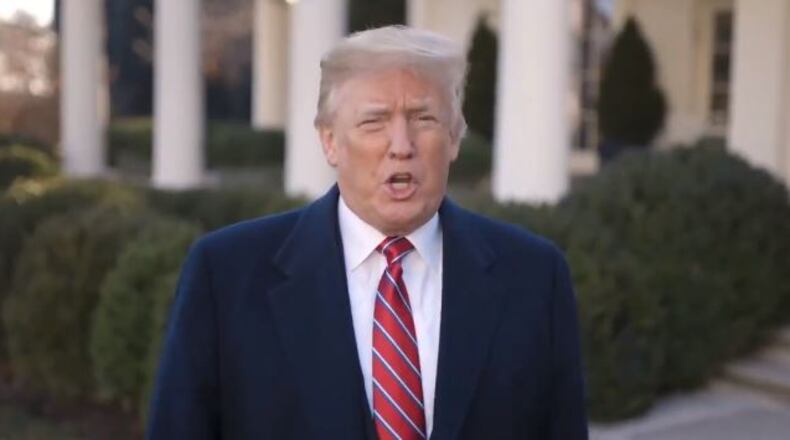The White House announced Monday that President Donald Trump would take his fight for extra money to deal with illegal immigration to the border with Mexico on Thursday, as negotiations between top officials and lawmakers in Congress seem to have produced little headway in a dispute that has created a 17 day partial government shutdown, which could lead some 800,000 federal workers to miss a paycheck at the end of this week.
"President @realDonaldTrump will travel to the Southern border on Thursday to meet with those on the frontlines of the national security and humanitarian crisis," White House Press Secretary Sarah Huckabee Sanders announced on Twitter late Monday morning.
The President also announced that he would address the nation on Tuesday night about the border; it was not immediately clear whether the address would be aired by the broadcast networks, and whether Democrats would get airtime for a rebuttal.
Those developments came as the White House has told Congress that it wants more money for "construction of a steel barrier for the Southwest border," echoing the comments of the President on Sunday, where he said he would be willing to move away from a concrete wall.
"We'll build a steel barrier," the President said as he returned from Camp David. "They don't like concrete," he said of Democrats, "so we'll give them steel. Steel is fine."
The extra money for the steel barrier came as part of a new request for over $7 billion in extra funding for the border, not only to build a barrier, but also to deal with the cost of detained migrants, anti-drug efforts, and increased law enforcement.
"The President continues to stress the need to pass legislation that will both reopen the Federal Government and address the security and humanitarian crisis at our Nation's Southwest Border," wrote Russ Vought, the Acting head of the Office of Management and Budget.
The request - sent to key members of the House and Senate Appropriations Committee - would add to the $1.6 billion that Republicans and Democrats had budgeted last year in the Senate for border security, as the White House wants more not only for fencing and other border security actions, but also money to deal with an influx of detained immigrants.
The White House request for funds includes:
+ $5.7 billion for "construction of a steel barrier" along the border with Mexico. This would be $4.1 billion over when lawmakers had originally planned to spend on border security (fencing, barriers, and other security measures).
+ $311 million for new border patrol agents; this would be an increase of $100 million.
+ $571 million for 2,000 'additional law enforcement personnel' to enforce federal immigration laws. This money was not included in the President's original 2019 budget.
+ $675 million for counter-narcotics efforts along the border. This would be an increase of $631 million over the 2019 Senate GOP plan.
+ An extra $798 million for detention of illegal immigrants. This would give the Trump Administration $4.2 billion to fund the 52,000 detention beds.
+ An additional $800 million 'to address urgent humanitarian needs,' to deal with detained illegal immigrants.
The budget request came after an unusual weekend of meetings involving Vice President Mike Pence and top Congressional staffers - no lawmakers of either party were present for the meetings, which was a signal to some on Capitol Hill that an agreement on border funding was not near.
Democrats said it was all a show for the President's political base.
In Congress, Democrats in the House were planning votes this week on four different bills to fund - and re-open - various parts of the federal government, which have been in a shutdown mode since a funding lapse started before Christmas, on December 22.
In the Senate, the first bill due on the floor in 2019 is slated to be on U.S. foreign policy in the Middle East - but Democrats made clear they would block any such action, arguing the Senate should only be voting to end the partial shutdown.
"The Senate should vote on nothing else until we vote to reopen the government. Period," said Sen. Tim Kaine (D-VA).
For those federal workers furloughed from their jobs, this Friday will be an important milestone, as it would represent their first missed paycheck.
"It's hard," one federal employee told me. "Depressing, that's for sure."
As of Monday, this shutdown had become the second longest such funding lapse. By Saturday, it would go past a shutdown which occurred over the holiday break at the end of 1995, and into early 1996.
About the Author


